

Hiroshima, Nagasaki, My Father, and the Lie of U.S. Innocence. American exceptionalism in a time of American malaise. Though a Frenchman was the first person to describe America as "exceptional" and a Soviet, Joseph Stalin, inadvertently helped popularise the phrase "American exceptionalism" - he called it a "heresy" - the notion the United States is not just unique but superior has long been an article of national faith.
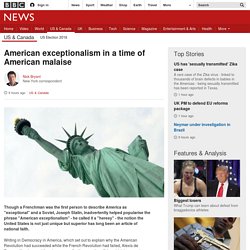
Writing in Democracy in America, which set out to explain why the American Revolution had succeeded while the French Revolution had failed, Alexis de Tocqueville observed Americans were "quite exceptional", by which he meant different rather than better. Over the centuries, however, the idea has taken hold here that America is liberty's staunchest defender, democracy's greatest exemplar and home to the usually brave - a country like no other. That America has emerged as the leader of the free world is not regarded as some cosmic fluke. Image copyright AP Losing faith Image copyright Reuters Consider the face that America has recently presented to the rest of the world.
Fortune. In February 2014, two of the world’s richest men, Bill Gates and Charles Koch, dined together at a West Coast restaurant.
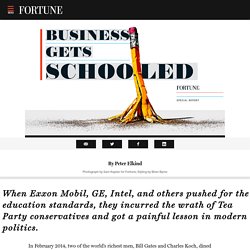
They made quite the odd couple: the Seattle Microsoft MSFT 0.85% co-founder, now devoting his time and fortune to changing the world, and the Kansas industrialist, still running his private conglomerate while working to shrink government to the size of a pea. The two discussed many subjects and even touched, diplomatically, on topics they disagree about, such as climate change. There was a second sensitive subject that Gates broached, and it didn’t come up by chance. His team at the Gates Foundation had engaged in a process it calls a “faction analysis” and identified Koch as a key opponent on a crucial issue. Gates had a mission that night: He wanted to persuade Koch to change his mind about Common Core. The two men were bankrolling opposite sides in a raging war over the future of American education. The ABCs of Common Core. How better policy will trigger fewer gun deaths. Glogin?URI= A Dashcam Catches Medford, Massachusetts Narcotics Detective Stephen LeBert Threatening a Motorist.
Politics An off-duty Medford, Massachusetts, cop threatened a motorist during a traffic stop.
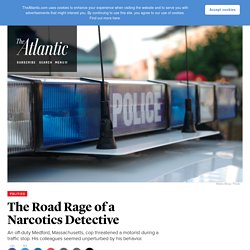
His colleagues seemed unperturbed by his behavior. Please consider disabling it for our site, or supporting our work in one of these ways Subscribe Now > Three years ago in Medford, Massachusetts, narcotics detective Stephen LeBert calmly told the brother of a man he was arresting, “He’s selling drugs illegally. After watching that video, it comes as no great surprise that Detective LeBert was suspended earlier this week for another instance of misbehavior recorded by a citizen: The footage, captured by the dashboard camera on a motorist’s vehicle, begins shortly after the driver got confused at a roundabout in an unfamiliar neighborhood and wound up briefly driving on the wrong side of the road (an error for which he would repeatedly apologize). “You’re lucky I’m a fucking cop,” LeBert says. But notice what those other, admirably polite police officers don’t do. In Iraq, I raided insurgents. In Virginia, the police raided me.
Alex Horton is a member of the Defense Council at the Truman National Security Project.
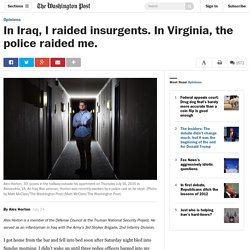
He served as an infantryman in Iraq with the Army’s 3rd Stryker Brigade, 2nd Infantry Division. I got home from the bar and fell into bed soon after Saturday night bled into Sunday morning. I didn’t wake up until three police officers barged into my apartment, barking their presence at my door.
Race and History. Race & the Law. Animated interactive of the history of the Atlantic slave trade. Source: slavevoyages.org For the full interactive version, use a larger device.
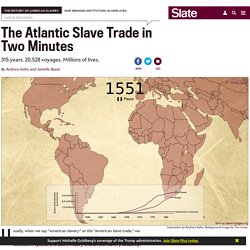
Interactive by Andrew Kahn. Background image by Tim Jones. Usually, when we say “American slavery” or the “American slave trade,” we mean the American colonies or, later, the United States. But as we discussed in Episode 2 of Slate’s History of American Slavery Academy, relative to the entire slave trade, North America was a bit player. Are Police Officers Sent to Too Many Places? The simplest way to reduce the number of Americans who are abused by police officers is not to retrain cops or to reform their subculture.
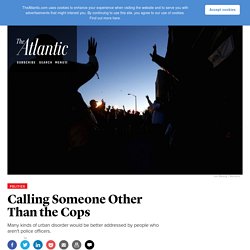
It is to significantly reduce the number of adversarial interactions people have with police. Questions about how frequently Americans ought to interact with law enforcement are often associated with the debate over Broken Windows theory. Its proponents champion a model of policing where foot patrolmen are a regular presence in high-crime neighborhoods, vigilantly guarding against the sorts of low-level disorder that ostensibly leads to more serious crime if left unchecked. For now, let's defer debate about Broken Windows theory. Even if it is correct, there are still a number of reforms that would reduce adversarial contacts with police officers without increasing disorder on the streets. Begin with the traffic stop. I've seen enough dash-cam videos like this to suspect that fielding police forces bereft of too-easily-frightened cops is impossible. The Most Important Divide in America is Growing. What cops say.